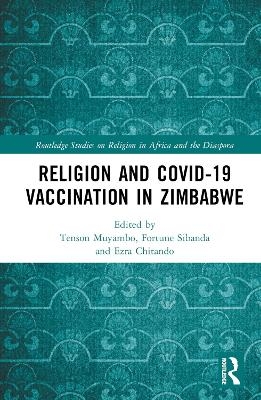
Religion and COVID-19 Vaccination in Zimbabwe
Routledge (Verlag)
978-1-032-48357-3 (ISBN)
This book analyses the role of religion during the COVID- 19 pandemic and vaccination rollout in Zimbabwe.
Zimbabwe was listed by the World Health Organization (WHO) as one of thirteen African countries to have fully vaccinated more than 10% of its population against COVID- 19 by the end of September 2021, but the country fell far short of the government’s own target for achieving 60% inoculation by December 2020. This book analyses whether religion played a role in explaining why the government’s pro- vaccine stance did not translate into high vaccination rates. Drawing upon various religions, including African indigenous religions, Christianity and Islam, the book considers how faith actors demonstrated vaccine acceptance, resistance or hesitancy. Zimbabwe offers a particularly interesting and varied case for analysis, and the original research on display here will be an important contribution to wider debates on religion and COVID- 19. This book will be useful to academics, researchers and students studying religious studies, sociology, health and well- being, religion and development.
Tenson Muyambo earned a PhD from the University of KwaZulu Natal (UKZN), South Africa. He is a research fellow at the University of South Africa’s (UNISA) Research Institute for Theology and Religion (RITR), College of Human Sciences. He lectures at the Great Zimbabwe University, and researches and publishes extensively on indigenous knowledge systems, religion (Ndau indigenous religion), gender, education, pandemics and African Spirituality. He has co- edited the books, Religion and the COVID- 19 Pandemic in Southern Africa (2022) and Re- imagining Indigenous Knowledge and Practices in 21st Century Africa: Debunking Myths and Misconceptions for Conviviality and Sustainability (2022). Fortune Sibanda (PhD) is a professor of Religious Studies in the Department of Philosophy and Religious Studies, Great Zimbabwe University, Masvingo and Department of Theology and Religious Studies, University of Eswatini, Eswatini. Professor Sibanda is also a research fellow in the Research Institute for Theology and Religion, UNISA, South Africa. He is a specialist in the History and Phenomenology of Religion; African Indigenous Religions and New Religious Movements (particularly Rastafari). His research interests include Indigenous Knowledge Systems, religion and health, religion and the environment, human rights issues, law and religion, religion and the culinary arts tackled from an African perspective. Sibanda has published edited books, book chapters and his work has also appeared in refereed journals. He is a member of a number of academic associations, including the American Academy of Religion (AAR), African Consortium for Law and Religion Studies (ACLARS), African Theological Institutions in Southern and Central Africa (ATISCA), Association for the Study of Religion in Southern Africa (ASRSA) and African Association for the Study of Religion (AASR). Professor Sibanda is a member of the ACLARS Publication Committee and ACLARS Board member. Ezra Chitando (DPhil) is a professor of History and Phenomenology of Religion at the University of Zimbabwe. His broad research and publication interests include method and theory in the study of religion, as well as religion, health, gender, security, politics, development, climate change, and sexuality, among others.
Chapter 1: Introduction: Religion and COVID-19 Vaccination in Zimbabwe
Tenson Muyambo, Fortune Sibanda & Ezra Chitando
Chapter 2: Bridging the ‘Social Distance’ between Public Health and Religion: Insights from Responses to COVID-19 Vaccines in Zimbabwe
Mutsawashe Chitando and Ezra Chitando
Chapter 3: Indigenous Knowledge Systems and COVID-19 : A Case Study of the Ndau in eastern Zimbabwe
Anniegrace Hlatywayo and Sophia Chirongoma
Chapter 4: Unpacking and Repackaging the Shona Funeral and Post Burial Rites in the Context of the Novel Corona Virus (COVID-19) in Zimbabwe
Beatrice Taringa & Sophia Chirongoma
Chapter 5: Situating mainline Christian churches’ responses to COVID-19 vaccination in Masvingo and Bikita Districts, Zimbabwe
Tenson Muyambo, Josiah Taru & Fortune Sibanda
Chapter 6: ‘Can anything good come out of Nazareth?’ (John 1:46): The Relevance of Apostolic Women’s Empowerment Trust in the Context of COVID-19 Vaccination in Zimbabwe
Tobias Marevesa and Fortune Sibanda
Chapter 7: Muslim response to COVID19 vaccination in Zimbabwe: A focus on Mberengwa ummah
Edmore Dube
Chapter 8: Migrant Communities and COVID-19 Vaccination at Tongogara Refugee Camp in Zimbabwe
Wisdom Sibanda
Chapter 9: COVID-19 vaccination in Zimbabwe: Sites and scenes of power contestations through the lenses of spirituality and uncertainty
Tarsisio M. Nyatsanza
Chapter 10: African Indigenous Churches’ response to the COVID-19 vaccination rollout in Zimbabwe: A case of Johane Marange Apostolic Church
Henerieta Mgovo
Chapter 11: ‘Disconcerting Vaccination Voices’: Experiences of diasporic Zimbabweans in the United Kingdom
Nomatter Sande and Silas Nyadzo
Chapter 12: Vaccination uptake and power dynamics: Insights from African Initiated Churches and traditional healers in Masvingo Province, Zimbabwe
Excellent Chiresh and Mavis Thokozile Macheka
Chapter 13: The Bible and COVID-19 Vaccination in Zimbabwe: Critical Reflections on the Influence of the Bible on both Vaccine Acceptance and Hesitancy
Makomborero Allen Bowa
Chapter 14: Vaccination in African Initiated Churches in Zimbabwe: A recipe for Church ideological bisection
Bernard Pindukai Humbe
Chapter 15: Shona Traditional Religion, Gender and COVID-19 vaccination in Zimbabwe: The case of Buhera South, Manicaland province
Maradze Viriri, Etwin Machibaya & Cuthbert Pisirai
Chapter 16: From Religion and COVID-19 Vaccination to Religion and Development? A Review
Ezra Chitando, Tenson Muyambo and Fortune Sibanda
| Erscheinungsdatum | 19.10.2023 |
|---|---|
| Reihe/Serie | Routledge Studies on Religion in Africa and the Diaspora |
| Verlagsort | London |
| Sprache | englisch |
| Maße | 156 x 234 mm |
| Gewicht | 453 g |
| Themenwelt | Naturwissenschaften ► Geowissenschaften ► Geografie / Kartografie |
| Sozialwissenschaften ► Politik / Verwaltung ► Vergleichende Politikwissenschaften | |
| Sozialwissenschaften ► Soziologie ► Spezielle Soziologien | |
| Wirtschaft ► Volkswirtschaftslehre | |
| ISBN-10 | 1-032-48357-1 / 1032483571 |
| ISBN-13 | 978-1-032-48357-3 / 9781032483573 |
| Zustand | Neuware |
| Informationen gemäß Produktsicherheitsverordnung (GPSR) | |
| Haben Sie eine Frage zum Produkt? |
aus dem Bereich


